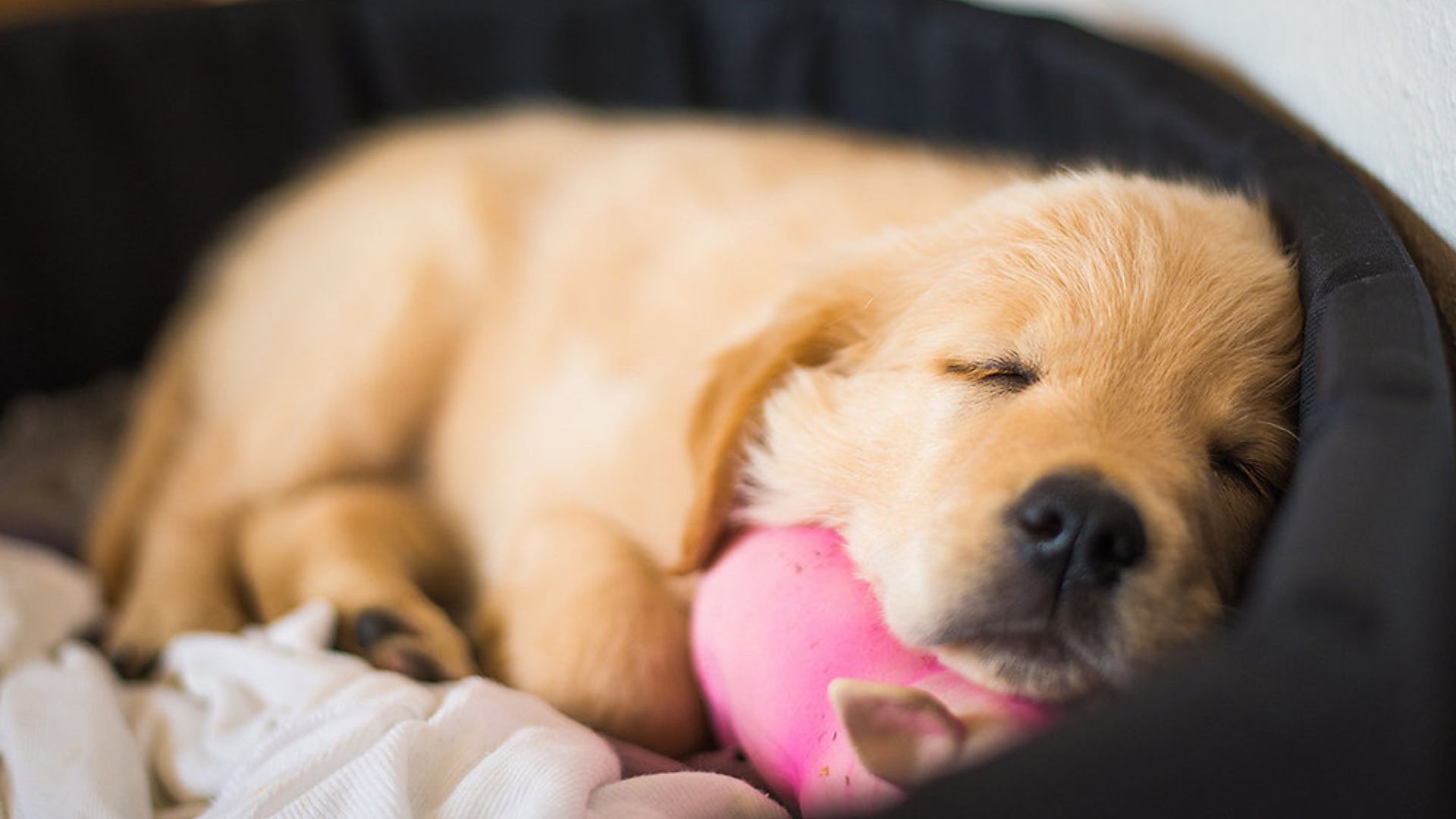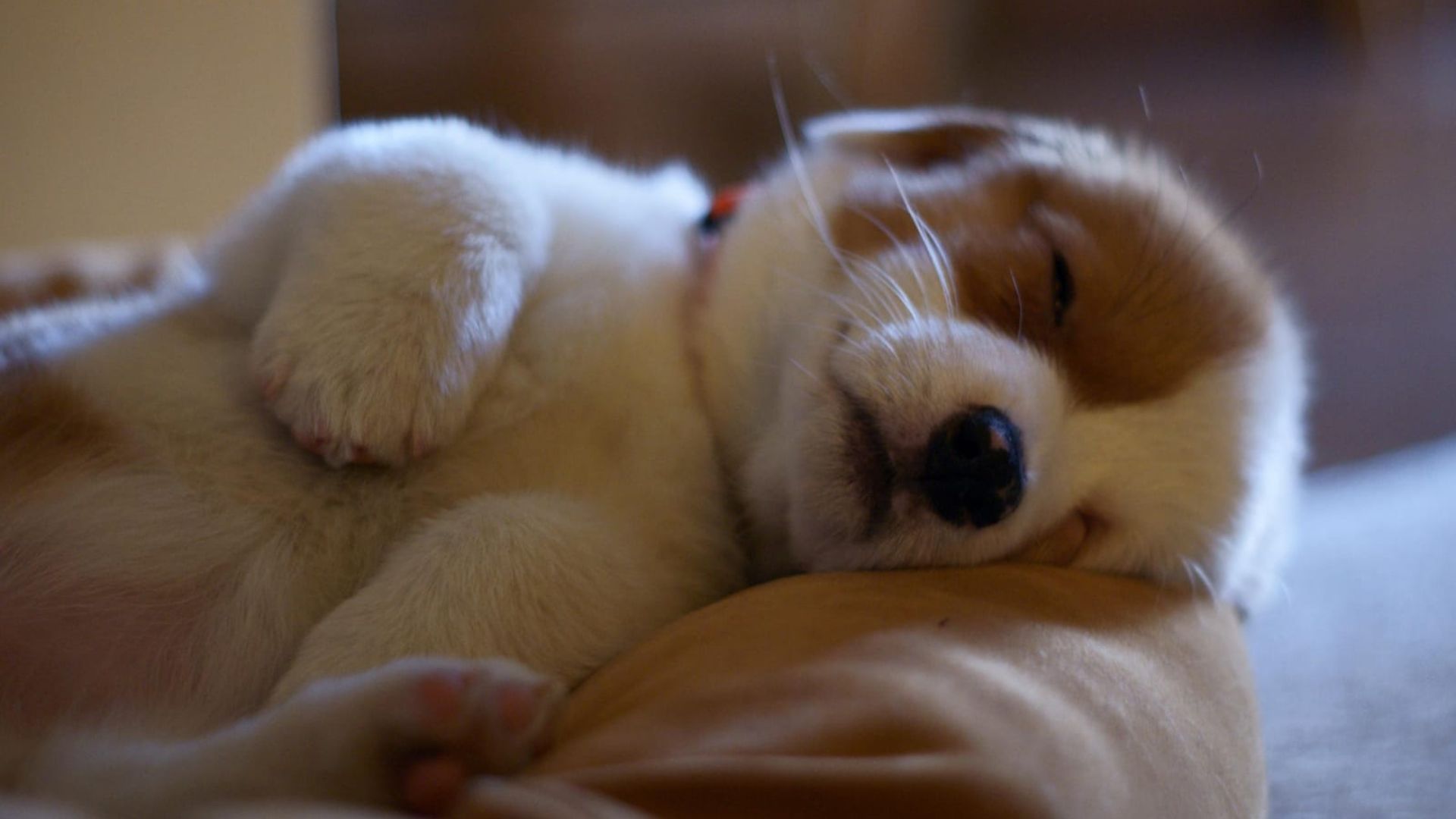The query “When Will a Puppy Sleep Through the Night” pertains to understanding when a young dog will develop the ability to sleep soundly through the night. This typically depends on factors like breed, age, and training. Patience and consistent routines are crucial for fostering better sleep habits in puppies.
The importance of a good night’s sleep for puppies
Ensuring your puppy gets a good night’s sleep is fundamental for their overall well-being and development. Puppies, like human babies, require ample rest to support their physical and mental growth. During sleep, their bodies release growth hormones crucial for muscle development and tissue repair. Adequate rest also aids in cognitive functions, helping them learn and retain information from their daily experiences.
Moreover, a well-rested puppy is more likely to exhibit positive behavior and temperament. Lack of sleep can lead to crankiness, increased stress, and difficulty in training. To promote a good sleep routine, provide a comfortable and quiet sleeping area, establish a consistent bedtime, and incorporate calming activities before sleep. Prioritizing your puppy’s sleep not only contributes to their health but also enhances the overall joy and companionship they bring to your home.
Common challenges faced by puppy owners
Welcoming a furry friend into your home brings boundless joy, but it also comes with its share of challenges for puppy owners. One common hurdle is the teething phase, where puppies explore the world with their mouths, often testing the resilience of your furniture and shoes. Housebreaking can be another trial, requiring patience and consistent training to establish good habits. Socialization presents its own set of challenges, ensuring your puppy grows up to be well-mannered around people and other animals. Veterinary care and vaccinations pose responsibilities that might seem daunting to first-time owners. Balancing these challenges with the sheer delight of puppy companionship demands dedication, but overcoming these hurdles fosters a deep and rewarding bond between you and your furry friend.
Puppy Sleep Patterns
Welcoming a new puppy into your home is an exciting adventure, but navigating their sleep patterns can be challenging. Understanding your puppy’s unique sleep needs is crucial for a harmonious relationship. In the first few weeks, newborn puppies can sleep up to 22 hours a day, with short wakeful periods for essential activities. As they grow, developmental changes, teething, and increased energy levels can influence their sleep duration and patterns. Creating a comfortable sleep environment, establishing a consistent bedtime routine, and incorporating regular physical activity are key strategies for promoting healthy sleep habits. Patience and consistency play vital roles in addressing common sleep issues such as nighttime whining and separation anxiety. By tailoring your approach to your puppy’s individual needs and celebrating small milestones, you can guide them towards restful nights and a happy, well-rested life.
Newborn puppy sleep cycles: Newborn puppies sleep up to 22 hours a day, with short wakeful periods for feeding and bathroom breaks. Understanding these initial sleep cycles is vital for setting realistic expectations.
Developmental changes affecting sleep: As puppies grow, their sleep patterns evolve. Teething, growth spurts, and increased energy levels can impact their ability to sleep through the night.
Factors influencing sleep duration: Breed, age, and individual differences contribute to variations in how long a puppy can sleep without waking. Recognizing these factors will help tailor your approach to your puppy’s unique needs.
Tips for Better Puppy Sleep
Welcoming a new puppy into your home comes with boundless joy, but ensuring your furry friend gets a good night’s sleep can be a challenge. Implementing effective strategies for better puppy sleep is key to a harmonious relationship. Start by creating a cozy sleep environment with a comfortable bed and soothing scents.
Establish a consistent bedtime routine, including gentle play and bathroom breaks, to signal it’s time to wind down. Regular exercise during the day helps expend energy and promotes a healthier sleep-wake cycle.
Address common sleep issues like nighttime whining by understanding the underlying reasons and responding appropriately. If separation anxiety persists, gradually desensitize your puppy to alone time. Consider medical factors if sleep disturbances persist. Remember, patience and consistency are vital in the process.
Celebrate small victories and adapt your approach based on your puppy’s unique needs. By following these tips, you’ll be on the path to better sleep for both you and your adorable companion.
Establishing a consistent bedtime routine: Just like children, puppies benefit from a consistent routine that signals it’s time to wind down. Incorporate activities such as gentle play, a bathroom break, and soothing moments before bedtime.
The role of physical activity in promoting sleep: Regular exercise not only tires your puppy but also promotes a healthier sleep-wake cycle. Find the right balance to ensure they expend energy without becoming overstimulated.
Addressing Common Sleep Issues
Puppy parenthood brings immense joy, but the journey to a peaceful night’s sleep can be challenging. Addressing common sleep issues is a crucial aspect of ensuring both your furry friend and you get the rest you need. Nighttime whining is a frequent concern, often signaling a need for attention or comfort. Understanding the reasons behind this behavior is the first step in addressing it effectively. Additionally, separation anxiety can disrupt your puppy’s sleep, requiring gradual desensitization and positive reinforcement.
If sleep troubles persist, consider potential medical factors and consult your veterinarian for guidance. Taking a proactive approach to addressing these common sleep issues ensures a smoother transition to a peaceful night for both you and your beloved puppy.
Nighttime whining and how to handle it: The reasons behind nighttime whining are crucial. It could be a call for attention, discomfort, or anxiety. Tailoring your response accordingly will help address this common issue.
Dealing with separation anxiety: Puppies, especially when newly adopted, may experience separation anxiety, leading to nighttime restlessness. Gradual desensitization and positive reinforcement can help alleviate this concern.
Medical considerations for sleep disturbances: If your puppy’s sleep troubles persist, it’s essential to rule out underlying medical issues. Please consult your veterinarian to ensure there are no health concerns affecting their ability to sleep.
Transitioning to a Full Night’s Sleep

The adventure of pup parenthood often involves navigating the challenging realm of sleepless nights. As your furry companion grows, transitioning to a full night’s sleep becomes a shared goal. Begin this journey by making gradual adjustments to bedtime routines. Small, consistent changes can pave the way for more extended periods of peaceful slumber. Monitor your pup’s progress closely, adapting strategies to suit their evolving needs. Celebrate the milestones achieved in this process, reinforcing positive behaviors with patience and dedication. Remember, the path to a full night’s sleep is a gradual one, requiring both understanding and persistence. By navigating this transition thoughtfully, you’ll not only ensure your pup’s well-being but also foster a stronger, more harmonious bond between you and your four-legged friend. Sweet dreams await as you guide your pup towards the serenity of a restful night’s sleep.
Gradual adjustments to bedtime: Rather than expecting immediate results, make gradual adjustments to your puppy’s bedtime. Small changes over time can lead to more sustainable sleep patterns.
Monitoring progress and making necessary changes: Pay attention to your puppy’s response to sleep training. Be flexible and make adjustments as needed, ensuring the process aligns with their individual needs.
Celebrating milestones in sleep training: Acknowledge and celebrate small victories in your puppy’s sleep journey. Positive reinforcement will motivate both you and your furry friend.
Importance of Patience and Consistency
When Will a Puppy Sleep Through the Night, In the realm of personal development, the importance of patience and consistency cannot be overstated. These two virtues form the bedrock of success, allowing individuals to navigate challenges and achieve long-term goals. Patience is the steady hand that guides us through moments of uncertainty, preventing hasty decisions and fostering resilience. Consistency, on the other hand, transforms positive habits into ingrained routines, propelling us toward sustained progress.
In any endeavor, whether it be learning a new skill, pursuing a fitness goal, or building a business, the synergy of patience and consistency yields remarkable results. Patience keeps us grounded during setbacks, reminding us that growth takes time. Consistency turns daily efforts into cumulative success, creating a momentum that propels us forward. Together, they are the dynamic duo that turns aspirations into achievements, emphasizing that the journey is as significant as the destination.
That progress takes time: Sleep training is a process that requires patience. Avoid frustration by acknowledging that improvements will happen gradually.
The impact of consistency on sleep training success: Consistency is key to any successful training. Stick to your established routine and strategies, reinforcing positive behaviors consistently.
Avoiding common pitfalls in the process: Be aware of common pitfalls, such as inconsistency or impatience, and proactively address them to maintain a positive sleep training experience.
Additional Considerations
When striving for a peaceful night’s sleep for your puppy, it’s crucial to delve into additional considerations beyond the basics. Recognizing breed-specific sleep patterns adds a tailored approach to your strategy. Certain breeds may require unique accommodations for optimal rest. As your puppy matures, adapting your tactics to age-related variations ensures sustained success. Moreover, understanding the direct impact of sleep quality on daytime behavior emphasizes the holistic nature of your efforts. Addressing these additional considerations enhances the effectiveness of your sleep training, fostering a harmonious relationship between you and your furry companion. Embrace these nuances, stay consistent, and watch as your puppy not only sleeps through the night but also thrives in overall well-being.
Breed-specific sleep patterns: Different breeds may have unique sleep patterns and requirements. Research your puppy’s breed to tailor your approach to their specific needs.
Age-related variations in sleep needs: As your puppy matures, their sleep needs may change. Be prepared to adapt your strategies to accommodate these age-related variations.
Factors influencing daytime behavior based on sleep quality: The quality of your puppy’s sleep directly influences their daytime behavior. Addressing sleep issues can contribute to a more well-behaved and happy pet.
Conclusion
When Will a Puppy Sleep Through the Night, recap of key points: Your puppy’s sleep needs, addressing common challenges, and implementing effective sleep training strategies are essential for a harmonious coexistence. With patience and consistency, you can guide your puppy toward peaceful nights and a healthier, happier life.
FAQ
At What Age Can a Puppy Sleep Through the Night Without Peeing?
Play with him, then put him back in his crate for a nap. Repeat in the afternoon, then put him back in his crate. Puppies can usually go all night without needing to pee between the ages of 4 to 6 months. However, keep in mind that each puppy is different, and some may achieve this milestone earlier or later
When Can Puppies Sleep Through The Night Without Feeding?
Your puppy probably will be able to sleep through the night once They are 16 Wochen alt. (Ungefähr vier Monate alt.) Around the same time, they gain sufficient muscle and bladder control so that they can hold everything in for a long time so that they can sleep all night without going to the bathroom.
Should I Wake a Sleeping Puppy to Pee?
They will expect the attention – Dogs may come to expect or rely on the attention and pee cues they receive during the night, making them less independent or able to control their pee schedule.
Do Puppies Need Water at Night?
Bring about two to three hours before bedtime the food and water bowls out. So, wenn Ihr Licht um 11 Uhr ausgeht, sollte ein Hund zwischen 8 und 8:30 Uhr keine Nahrung oder Wasser haben. Dies gibt Ihnen die Möglichkeit, ihn für one last potty break before settling in for the night.
How Many Times Do Puppies Poop a Day?
It is not uncommon for a puppy to defecate 5-6 times per day. Some will be eliminated . Die gute Nachricht ist, dass das Tempo der Notaufnahme des Hundes mit zunehmendem Alter abnimmt. A 2-week-old puppy may vomit at every feeding, but by 12 weeks, they may only vomit 4 times a day.

